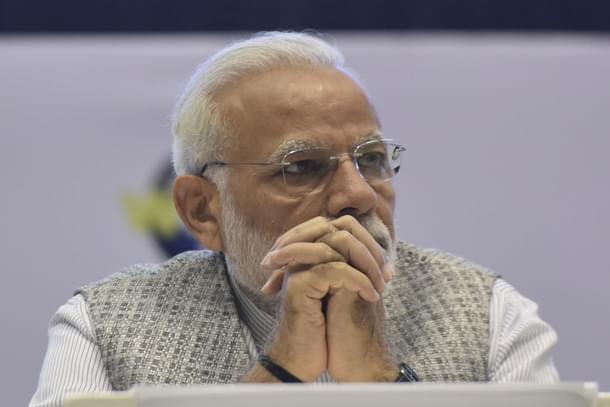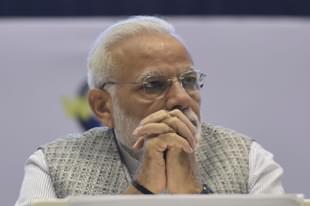Politics
PM Modi Interview 9: His Take On Catalytic Role Of PMO, Government’s ‘Talent-Deficit’ And Congress’s ‘Emergency Culture’
R Jagannathan
Jul 03, 2018, 01:48 PM | Updated 01:48 PM IST
Save & read from anywhere!
Bookmark stories for easy access on any device or the Swarajya app.


In the last segment, Narendra Modi talks about the power of his PMO, the alleged talent deficit in his government, and the allegations of rising intolerance in an atmosphere of curtailed democracy and debasement of institutions. (Read the previous parts here)
Swarajya: Let’s talk about the government. It is said that this is the most powerful PMO in recent years? Concentration of powers in the hands of one office does not augur well for our nation.
Modi: The answer to your question lies within your question itself. If the benchmark of comparison of the present PMO is with the previous PMO, then I don’t think anyone will be surprised to find it more decisive and powerful. Everyone knows how things ran under the UPA government. The PMO was reduced to a game of politics instead of being the driver of good governance. And whenever politics takes centre stage, governance takes a back seat.
Under this NDA government, there is no such confusion or misplaced priorities. Each institution and at every level of governance is enabled and empowered to do what it is meant to do. The PMO also faithfully and effectively carries out its responsibility of providing the necessary clarity, decisiveness and facilitation that is needed for the government to deliver its commitment of good governance and development.
Swarajya: This is too generic an explanation…
Modi: To go beyond mere generalities, one should understand the underlying structure of our government system. The roles and responsibilities of each office are clearly laid out in the allocation of business rules. The PMO’s mandate is to offer secretarial assistance to the Prime Minister. Ministries drive the governance agenda in their respective domains and verticals, while horizontal offices like the NITI Aayog, Cabinet Secretariat and PMO may provide the cross-sectoral, longer-term, bigger-picture perspective.
Therefore, functioning as a catalytic agent, the PMO facilitates, coordinates and converges the agenda and priorities of the various members of ‘Team India’ – a team comprising not just of our central ministries, but encompassing each and every state government. Take the example of our Pragati initiative, wherein using technology we bring onto the same platform every month, all central ministries, state governments and even district administrations, to solve problems and debottleneck long-standing issues and challenges, at times even dating back decades. Would you call this centralisation and interference, or decisive intervention that activates and enables?
Let me give you another example of healthcare. Today, India is witnessing a transformation in the sector. India’s strides are being powered by the stellar teamwork of the Ministry of Health and Family Welfare, Ministry of Women and Child Development, Ministry of Chemicals and Fertilisers, Ministry of Ayush and Ministry of Drinking Water and Sanitation. The PMO provides assistance in coordinating and bringing together so many different ministries and departments. From silos created due to isolated working, we are working towards solutions due to integration.
On the whole, the erstwhile regime, running on the whims and fancies of select ‘powerful’ individuals, has been decisively replaced by an institutionalised and democratic governance process, functioning by the letter and spirit as laid down by our farsighted forefathers in our Constitution.
In this PMO, 125 crore people are our ‘high command’.
Swarajya: There seems to be a talent-deficit in your ministry… Some ministers don’t seem to be performing well…
Modi: This is an incorrect perception. Just because only a few ministers and ministries make it to the front pages or prime-time debates, they are deemed as talented and others are deemed the opposite. The conventional mindset is also to bracket ministries and make presumptions about their value.
However, the work culture of this government is different. I would like to illustrate my point with a few examples.
Let us talk about rural housing. This is not a sector that is connected to cities or the digital world.
In the last four years, more than one crore houses have been built in rural areas. This is a big number. Crores of Indians who did not have a shelter over their head now have their own homes.
Just to give you an indication of the extent of work done by the team working on rural housing, the UPA, in their last four years, from 2010 to 2014, built 25 lakh houses. This is one-fourth of what the NDA government has built. This is the work done by someone many in the media will call ‘non-talented’.
I would like to give you another example – of the Ministry of Social Justice and Empowerment.
Conventional wisdom suggests that this ministry is not “glamorous” and hence it does not make as much news as it should but let me give you a glimpse of the exceptional work this department has done.
This year, the budget allocation for the welfare of SC and ST communities stood at Rs 95,000 crore and there was a whopping 41 per cent rise in the budget for the welfare of OBCs.
It was under this ‘non-talented minister’ that our government had the honour of bringing the strongest amendments in the SC/ST Act.
The government of India is developing the five notable places associated with Dr Babasaheb Ambedkar as ‘Panchteerth’. In two cases, the Mahaparinirvan Bhumi at 26, Alipur Road in Delhi, and the Dr Ambedkar International Centre at 15, Janpath, I had the honour of both laying their foundation stone and inaugurating these buildings.
The Rights of Persons with Disabilities Act, 2016, raised the types of disabilities from seven to 21. For the first time, victims of acid attacks have been included in the list. The act includes provisions for right to free education for Divyang children from the ages of six to 18.
Reservation for persons with disabilities for government jobs has been raised from 3 per cent to 4 per cent. This will bring several more opportunities for our Divyang sisters and brothers.
In the last four years, the ministry has hosted over 7,200 camps due to which 11 lakh persons with disabilities benefited.
Substantial progress has been made under the Sugamya Bharat Abhiyan in ensuring dignity and equal opportunity for persons with disabilities. Due to these proactive efforts, the pace of making government buildings accessible is unparalleled. Similarly, all 34 international and 48 domestic airports are accessible and so are 644 out of 709 A1, A and B category railway stations.
All these works have happened due to the active role of the ministry, both in terms of ideation and coordinating with other departments.
In this interview itself I have spoken at length about the strides in agriculture… under a ‘non-talented’ minister, the department has undertaken futuristic initiatives such as soil health cards and the Pradhan Mantri Fasal Bima Yojana that are helping crores of farmers.
These are just three examples I have given… I am proud of all my colleagues and their work.
Swarajya: There is lot of talk about Indian democracy being threatened and rising intolerance… There are some extreme views gaining ground that freedom of expression and sanctity of institutions are shrinking under the BJP. How do you respond to this?
Modi: You yourself have used the right word for such views – extreme!
Recently, the nation observed the 43rd anniversary of the Emergency. It was an attack on freedom of press, freedom of expression, sanctity of institutions and democracy itself. Many of our senior leaders bore the brunt of the Emergency because they stood up to fight for these rights.
In fact, some of our leaders, including sitting Cabinet ministers, ministers in various states, went to jail during the Emergency and withstood lathis. This shows how much we cherish democratic values and freedom. Hence, I find such a discourse about damage to institutions under the BJP absurd and incorrect. That is not our value system at all.
In fact, if you look at India’s history since 1947, it is the Indian National Congress that has subverted our democracy, judiciary and media, time and again.
As early as 1959, which is less than a decade after we became a Republic, the Nehru Government dismissed a democratically-elected Communist government in Kerala. A detailed study of the number of times Congress governments imposed Article 356 will present a chilling picture of how they held our democracy to ransom. Mrs Indira Gandhi herself imposed Article 356 over 50 times and that too on flimsy grounds. If one family did not like a particular state government, all resources were devoted to get it dismissed or toppled.
Swarajya: But that era is over…
Modi: The Congress party’s culture is the culture of the Emergency – arguably the darkest period after 1947. The media, courts, arms of the government were held hostage to power politics and an anti-democratic mindset.
Look at the events in the last seven to eight years as well. The Congress went on an overdrive to discredit every possible institution. From Modi hatred, they have graduated to India hatred.
The Congress also has different tricks for the time when they are in power and when they are in Opposition, but even then, disrespect for institutions is visible. In power, their leaders victimised an Army Chief and the CAG just because they did not toe the Congress line.
In Opposition, they mocked the Indian Army for the surgical strikes, they find fault with our other security forces. Now they also attack reputed rating agencies that are optimistic about India, they discredit the RBI… now they are after the courts.
Their onslaught on the election process of India is alarming. They did not find EVMs faulty when they won in 2009 or in various states. Instead of introspecting why, in state after state, people are rejecting them, the Congress is finding fault in the poll process. What can one say to such a thought process?
As for the media, I have time and again said that constructive criticism by the media strengthens our democracy and more constructive criticism is welcome. The advent of social media has in fact made our discourse a lot more democratic. Earlier, while only a handful of self-appointed experts were seen speaking about issues, now all it takes is a tweet or Facebook post by a common citizen of India to express himself or herself. This is the power of social media.
Our institutions and our democracy are vibrant as always. India’s democratic ethos can’t be trampled over.
(Concluded)
Jagannathan is former Editorial Director, Swarajya. He tweets at @TheJaggi.





